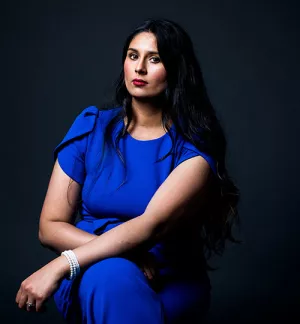Featured in the Belfer Center Spring 2021 Newsletter »
Syra Madad is a nationally recognized epidemiologist in public health and special pathogens preparedness and response. A Belfer Center Fellow, she directs the Special Pathogens Program at New York City Health + Hospitals. During the pandemic, she has written and spoken widely on health tips for the public and frontline health providers. She also organized a popular COVID seminar series at the Belfer Center. We asked Syra to tell us how she maintains her energy and activity in this extremely challenging work.
Q. During the past year, you have done extensive writing and speaking to educate the public and frontline health providers about COVID – all while continuing your work with NYC Health and Hospitals, raising a family, and recovering from COVID yourself. What’s your secret for keeping up this pace?

I’ve been working in the space of emergency management which deals with disasters and emergency response for more than 10 years so I’m used to high stake events, multi-tasking, and stressful situations. I used to say responding to Ebola was stressful; boy was I wrong! Over the years, I built up an overall self-resiliency and picked up a few traits that have helped me stay focused and able to do multiple things at once: being disciplined about time management, prioritizing and triaging my endless to-do lists, keeping emotions part of it (we’re humans, letting emotions be part of the response helps bring meaning and focus to it), no shame in asking for help (my person of the year is my husband) and most important—ambition. Where there’s a will, there’s a way.
Q. What aspects of your work during this pandemic have been the most challenging and most rewarding?
Working as an infectious disease epidemiologist and leading the System-wide Special Pathogens Program in the largest public health hospital system in the nation with an amazing all-women team has been the most rewarding part of my life. Every person on my team is a super hero, from the special pathogen interns who volunteer their time to help in the more than two dozen projects we have ongoing to the fulltime staff who carry out the tenets of infectious disease emergency response. Besides the work we do in pandemic preparedness and response, we also work to maintain readiness and prevent outbreaks from becoming full-blown epidemics or pandemics. It’s the hard but silent work that happens behind the scenes that keeps them safe. The most challenging is keeping up with the volume – both in terms of updated guidance and translating it into operational readiness.
Q. You have written about mental health challenges facing health providers on the frontlines. What advice do you give them?
Self-care is not selfish. Without a healthy you, there’s no healthy “we.” This pandemic has been the longest emergency response activation in most of our careers; it’s been a marathon and sprint, so taking care of yourself and seeking help is important.
Q. Was your earlier work against Ebola and Zika helpful in tackling COVID?
Yes, absolutely. While every outbreak is unique, there’s a basic foundation we use and build on, outbreak after outbreak, and there are many lessons learned from previous outbreaks that can and should be applied to current threats. One thing that is so important is ongoing risk and science communication. We must provide ongoing, clear, concise, transparent and science-based information and advice to the public. If we've learned anything from all outbreaks, it’s that the frontline starts with the people. We all have the power to prevent outbreaks.
Q. With vaccinations becoming broadly available and COVID cases decreasing in most of the U.S., what is your main advice to the public and government leaders today?
Every vaccination counts! Share your story of why you got vaccinated; help your friends, neighbors, and family members to get vaccinated. The vaccine not only protects the individual from the devastating effects of COVID19, it helps the community with less virus circulating – and the faster we can end the acute phase of this pandemic! Also, be thoughtful in the information you share and ensure it’s based on science and evidence– not conspiracy theories or junk science. Each of us has a platform, so let’s start using it.
"Q&A: Syra Madad." Belfer Center Newsletter, Belfer Center for Science and International Affairs, Harvard Kennedy School. (Spring 2021)


